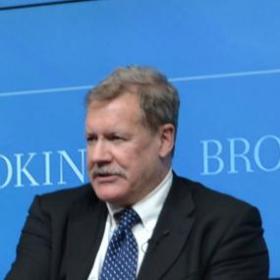
E-Postcard from Tokyo
On a beautiful spring day in downtown Tokyo, it is hard to process the sense of threat that Japan’s government feels on occasions about its strategic environment. North Korea has nuclear weapons and has twice mounted conventional force attacks on South Korean targets in the last year. China’s navy has been more visible in contested ocean waters, and around a disputed island territory, as it pursues a defense modernization unfaltering since 1978. Japanese sources talk of a more aggressive faction in the Chinese navy that the Communist Party leadership works hard to constrain. Russia has just installed new anti-ship missiles on the disputed Northern Territories. Rising oil prices put pressure on Japan’s already enfeebled economy. And it faces escalating cyber attacks.
The sense of alarm can only have been heightened when, this past week, the United States Secretary of State, Hillary Clinton, invoked the United States Congress to "put aside the humanitarian, do-good side of what we believe in.” She said, “Let's just talk straight realpolitik. We are in competition with China." While this is not news to the Japanese government, their sense of heightened alarm will come from an understanding of the way China’s leaders will react to the Clinton statement. It represents a fundamental abandonment of the soft rhetoric that the United States kept up for more than two years in the run-up to the state visit of China’s President Hu Jintao in January this year. The neo-cons in Washington, who spent so much effort in the first Bush Administration to compete with China in realpolitik terms, will be smiling.
The United States has hardened its position on China because of the latter’s growing cyber warfare and space capabilities. "Advances by the Chinese military in cyber and anti-satellite warfare pose a potential challenge to the ability of our forces to operate and communicate in this part of the Pacific," Defense Secretary Robert Gates told a Japanese audience on 13 January in Tokyo.
That anodyne statement brings out into the open the growing mistrust of China in the United States because of its relentless cyber operations against American targets.
Japan and the United States have formalized a cyber alliance which, according to one source, commits both sides to renouncing cyber operations against the other. If true, and it may not be, this would be a significant first in international relations. Japan’s 2010 Defense Guidelines elevate cyber warfare capabilities to a new level. In a white paper issued in May 2010 by the Information Security Policy Council, Japan made plain its need to prepare for cyber war directed at its critical infrastructure.
One reference point for Japan’s heightened concern is a series of coordinated attacks on its allies in 2009. According to Professor Motohiro Tsuchiya: “In 2009, massive scale of cyber attacks was recorded in the U.S. and South Korea, including the Department of Defense (DOD), the U.S. Congress, the Treasury, the Department of Homeland Security (DHS), Federal Trade Commission (FTC), New York Stock Exchange (NYSE), Washington Post, among others.”
The right response to cyber threats of any kind, according to Professor Eva Vincze of George Washington University, has many levels. Affirming that technology by itself is insufficient, and emphasizing the human factor, she calls for international consultations with stakeholders with a view to improving communication based on span trust.
So where does that leave Japan? It must work, as other countries are also now realizing, to mount a diplomacy of cyber security, or cyber diplomacy. This will need to engage the countries, like China, North Korea and Russia, that Japan mistrusts most. Japan will need to construct a cyber arms control agenda, including confidence building measures, with its neighbors.

